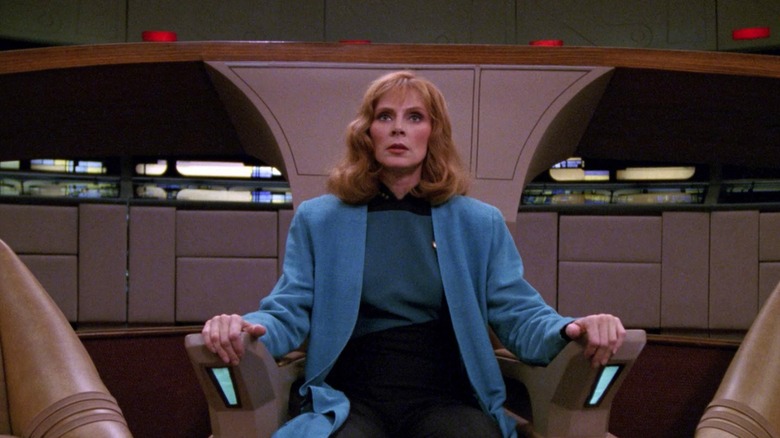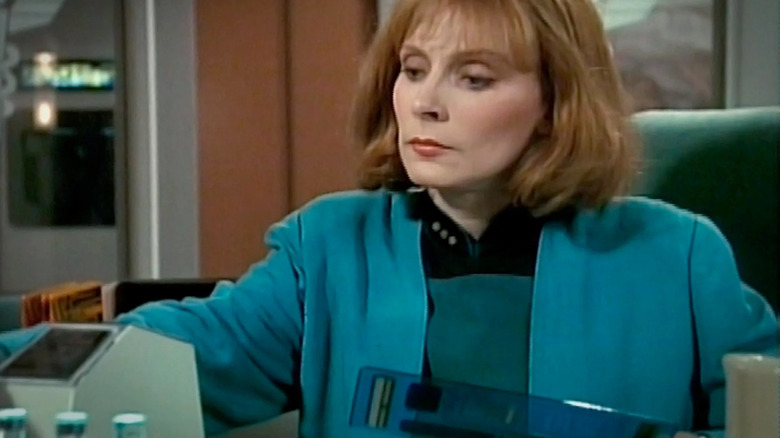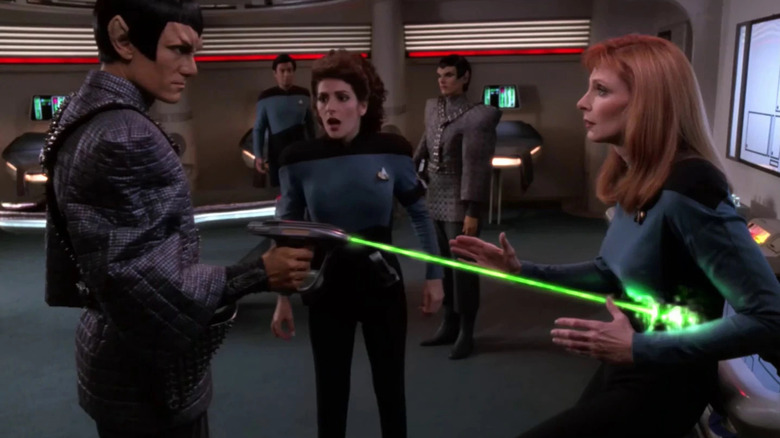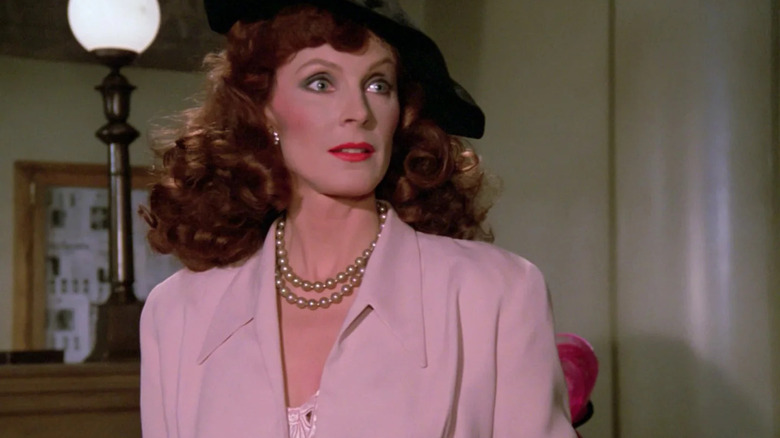Why Star Trek's Dr. Crusher Rarely Got Her Due
Actress Gates McFadden has said in interviews that she felt unsatisfied by her character's arc on "Star Trek: The Next Generation." For six of the show's seven seasons — and for four feature films — McFadden played the stalwart and morally upstanding Dr. Beverly Crusher, the chief medical officer on the U.S.S. Enterprise-D. She was the only parent at the start of the show, a first for the main cast of a "Star Trek" show. Eventually Worf (Michael Dorn) would have a son, and Data (Brent Spiner), Counselor Troi (Marina Sirtis), Commander Riker (Jonathan Frakes), and Captain Picard (Patrick Stewart) would be given children for single episodes, but Dr. Crusher was the only character to weather being a parent in dialogue on a regular basis.
Dr. Crusher was also vital to the ensemble of NextGen, providing the show with its moral hard line. Most of the other characters on "Next Generation" were immature in some way, having to grow past awkward parts of themselves. Worf, for instance, was lonely, aggressive, and had to learn how to better interact with his human (and android and Betazoid) co-workers. Geordi LaForge (LeVar Burton) was not socially confident, and had trouble making friends and getting dates. Even Picard, while a staunch and capable commanding officer, was in a constant state of learning to be more humane and open-minded. Data was a clear favorite in the writers room, as he had the most to learn of all the characters, giving the showrunners ample opportunity to explore his many facets.
But what about Dr. Crusher?
Holding the moral line
Dr. Crusher entered the show more or less fully formed. She was already a chief medical officer, so there was no drama with her career. She had already been married and widowed, and was now busy with her parenting and her job. Vitally, Dr. Crusher was unambiguous about her fierce morality. If she saw something was wrong, she'd say it out loud, right in front of the ship's captain. If a terrorist was doing something she objected to, she would say so right to his face. When Captain Picard was replaced by an imposter, and the imposter began to come on to her, she would state very plainly that — professionally — they shouldn't cross that line. Dr. Crusher was often prepared for extreme situations, be they medical or social. She was a mature character who made quick decisions quickly.
And that, sadly, might be the very thing that kept her from starring in more episodes.
Starting in the show's third season, "Star Trek: The Next Generation" saw a dramatic change of leadership. A producer named Maurice Hurley left the show, allowing the staff to bring back McFadden who, the story goes, was hated by Hurley (McFadden was briefly replaced by Diana Muldaur, playing Dr. Pulaski). Rick Berman and Michael Piller eventually took over as executive producers, and the show — Trekkies immediately noted — became more character centric than in its first two seasons. Early on, many NextGen stories were ensemble-based. In season 3, one might see a Data episode, a Worf episode, etc.
Sadly, Dr. Crusher was highlighted a precious few times. Writers, it seems, couldn't think of stories for a character who was already grown up, as it were.
She had her moments
As it stands, Dr. Crusher was given a few notable moments to shine. In the episode "The High Ground" (January 29, 1990), Beverly is abducted by a terrorist group and taken to their underground base. The terrorists are using a rare type of long-range transporter that is doing damage to their bodies, and Dr. Crusher is ordered by her abductor to heal them. She is emphatic about how much she objects to what they were doing, and that terrorism and violence only tend to beget more violence on both sides. She heals the sick because that is her moral obligation. Admirably, Dr. Crusher never comes to approve of the terrorist's tactics, hoping that a diplomatic solution can be found. When Picard later comes blazing in with phasers, Dr. Crusher gets to see her own people behaving rashly. As the show's moral center, audiences can see how horrible everything was through her eyes.
In "Remember Me" (October 22, 1990), Dr. Crusher finds herself in a nightmarish scenario. A visiting friend not only vanishes mysteriously, but no one on the Enterprise seems to remember him coming aboard. Then other characters begin vanishing in a similar fashion. It's not long before Dr. Crusher and Captain Picard are the only two people on the ship, with Picard having no memory of a crew. Beverly keeps her wits about her, and refuses to accept that she is going mad. "Remember Me" is one of the few instances when Dr. Crusher is permitted to deal with a strange crisis on her own terms. It turns out she is just as intelligent and resourceful as her crewmates.
But where do we go from here?
In the episode "Disaster" (October 21, 1991), Dr. Crusher is locked in a shuttlebay with Geordi, and the two are able to mutually apply their wits to solving the problem of a radiation leak. Dr. Crusher is also a great team player.
But despite these episodes, Dr. Crusher rarely had moments to shine. Ironically, her character was so strong, and McFadden played the part so well, that she was relegated to the back, offering input and insight into a group crisis, but rarely leading the charge. Not to sound dramatic, but she was almost too good, too moral, too complete to be the focus of many episodes.
Of course, underwriting several characters is a natural problem that stems from an ensemble program like "Star Trek: The Next Generation." Writers will eventually group around the characters they like, and others will, as a result, get the short end of the stick. For every Data episode, a Troi episode is not being written. Incidentally, Counselor Troi can sense emotions, possesses a degree in psychology, and sits next to the captain in the bridge. One would think she'd be featured in stories where she gets to take on the role of the world's best diplomat. But writers rarely gave her stories of her own, usually only following her when her mother was visiting.
And Dr. Crusher had stirring leadership skills, personal drama, great relationships with her co-workers, and a notable field of meticulous expertise. Luckily, when McFadden returns to the role for the third season of "Star Trek: Picard" in March of 2023, she will have significantly more to do.



